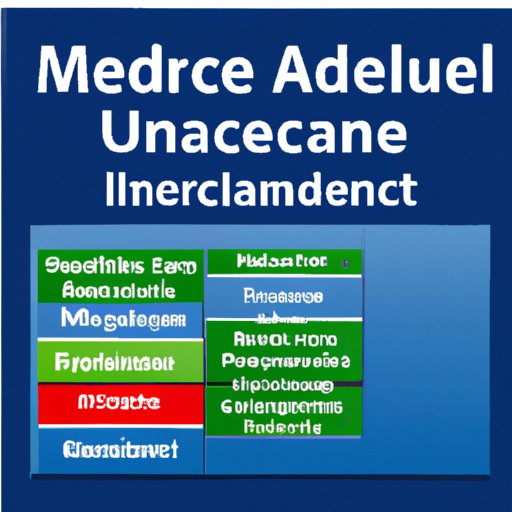Introduction
Getting access to quality healthcare is one of the most important things you can do to ensure your long-term health and wellbeing. If you’re over 65 years old or meet certain other qualifications, you may be eligible for Medicare. But how old do you have to be to get Medicare? In this article, we’ll explore the age limits for Medicare coverage and answer all your questions about eligibility.

Exploring the Eligibility Age Requirements for Medicare
Medicare is a government-funded health insurance program that provides coverage for people aged 65 and over, as well as younger individuals with certain disabilities. To qualify for Medicare, you must meet certain age requirements. But what is the minimum age to receive Medicare benefits? Let’s take a look at the age limits for Medicare coverage.
How Old Do You Have to Be to Qualify for Medicare?
In general, you must be at least 65 years old to qualify for Medicare coverage. However, if you are under 65 but have a qualifying disability, you may still be eligible for Medicare. Additionally, some individuals may qualify for Medicare before they turn 65 if they meet certain criteria. These include individuals who are receiving Social Security Disability Insurance (SSDI) benefits or Railroad Retirement Board (RRB) benefits.
A Guide to the Age Limits for Medicare Coverage
If you’re wondering when can I start receiving Medicare benefits?, the answer is that it depends on your specific situation. Here’s a breakdown of the age requirements for Medicare:
- Age 65 and over: Individuals who are 65 and over are eligible for Medicare Part A and Part B. Part A covers hospital care, while Part B covers doctor’s visits and other medical services.
- Under age 65 with a qualifying disability: Individuals under 65 who are receiving SSDI benefits or RRB benefits may qualify for Medicare Part A and Part B. Additionally, individuals who have been diagnosed with End Stage Renal Disease (ESRD) or amyotrophic lateral sclerosis (ALS) may also be eligible for Medicare coverage.
- Under age 65 with a qualifying medical condition: Individuals with certain medical conditions may be eligible for Medicare Part A and Part B even if they are under 65. These conditions include permanent kidney failure treated with dialysis or a kidney transplant, Lou Gehrig’s disease, and certain disabilities that qualify for Social Security Disability Insurance (SSDI).
It’s important to note that there are other factors besides age that may affect your eligibility for Medicare. For example, you must be a U.S. citizen or legal resident and you must have worked in the U.S. for at least 10 years to qualify for Medicare Part A. Additionally, you may need to pay premiums for Part A and Part B coverage.

Navigating the Rules for Medicare Eligibility
Understanding the age requirements for Medicare entitlement can be complicated. It’s important to research your options and contact your local Social Security office for more information. The Social Security Administration can help you determine whether you’re eligible for Medicare and provide information about the enrollment process.
You can also review the official Medicare website for more information about eligibility and enrollment. According to the Centers for Medicare & Medicaid Services, “Medicare is a federal health insurance program for people age 65 or older, certain younger people with disabilities, and people with End-Stage Renal Disease (permanent kidney failure requiring dialysis or a transplant, sometimes called ESRD).”

Understanding the Age Requirements for Medicare Entitlement
When it comes to understanding the age requirements for Medicare entitlement, it’s important to keep in mind that the eligibility rules can vary depending on your individual circumstances. For example, if you are under 65 but have a qualifying disability, you may still be eligible for Medicare. Additionally, some individuals may qualify for Medicare before they turn 65 if they meet certain criteria.
It’s also important to remember that Medicare eligibility is not guaranteed. Depending on your situation, you may need to pay premiums and/or enroll in a Medicare Advantage plan to get coverage. Additionally, Medicare does not cover all medical expenses, so it’s important to understand what is and isn’t covered by Medicare.
Conclusion
Overall, the age requirements for Medicare entitlement depend on your individual circumstances. Generally, you must be at least 65 years old to qualify for Medicare. However, if you are under 65 but have a qualifying disability or medical condition, you may still be eligible for Medicare. It’s important to research your options and contact your local Social Security office for more information.
In summary, the age limits for Medicare coverage vary depending on your individual situation. To qualify for Medicare, you must meet certain age requirements and may need to pay premiums for Part A and Part B coverage. By researching your options and understanding the eligibility requirements for Medicare, you can make sure you get the coverage you need.
(Note: Is this article not meeting your expectations? Do you have knowledge or insights to share? Unlock new opportunities and expand your reach by joining our authors team. Click Registration to join us and share your expertise with our readers.)
